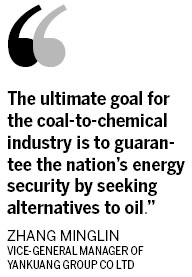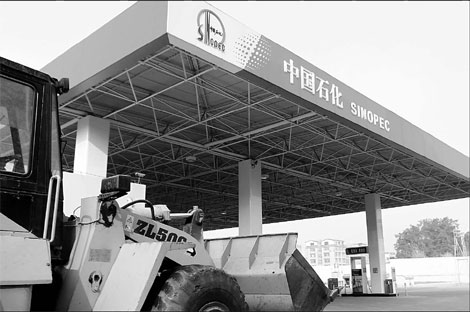Sinopec gets into coal chemicals
|
A Sinopec gas station in Liuzhou, the Guangxi Zhuang autonomous region. The largest oil refiner in Asia said earlier that more than 70 percent of its total crude oil for refining purposes is imported. A new coal-chemical project in Henan province is expected to reduce that heavy reliance on imports. Deng Keyi / For China Daily |
$3.3 billion joint venture in Henan province to make olefins from methanol
BEIJING - China Petrochemical Corp, or Sinopec Group, will further tap into the coal-to-chemical sector by making an investment of about 21 billion yuan ($3.3 billion) in a joint venture project in northern Henan province by the end of this year, a source from the company said on Tuesday.
Sinopec Group, Asia's biggest oil refiner, will have a 51-percent stake in the methanol-to-olefins joint project, and the Henan government will hold the rest.
The project is expected to have a designed production capacity of 1.8 million tons of olefins annually, the source said.
The joint venture is part of a larger plan under which Sinopec, working with the local government, will build a complete industry chain that uses coal as a feedstock source for methanol, which will be converted into olefins.
Under the plan, Sinopec will set up another joint venture with the Henan government for the conversion of coal to methanol.
Sinopec will have a 49-percent stake in that project, and the local government will hold 51 percent. The total investment amount is still being decided.
Sinopec's Zhongyuan Petrochemical Corp, based in Henan province, already has a methanol-to-olefins project with an annual production capacity of 600,000 tons of olefins.
The Beijing-based energy conglomerate has established a team led by Chairman Fu Chengyu to further tap into the sector, according to the Sinopec Group spokesman Huang Wensheng.

The company's move is part of a strategy to diversify its investment portfolio and reduce its heavy dependence on crude oil imports during the nation's 12th Five-Year Plan (2011-2015), analysts said.
Sinopec said earlier that more than 70 percent of its total crude oil for refining purposes is imported.
The ultimate goal for the coal-to-chemical industry is to guarantee the nation's energy security by seeking alternatives to oil, said Zhang Minglin, vice-general manager of Yankuang Group Co Ltd, which was one of the earliest companies to move into the coal-to-chemical industry.
Imports provide more than 50 percent of the country's crude oil. Experts have said that China's reliance on foreign oil will keep rising to support economic expansion.
However, rich resources in coal have made China generally self-sufficient in energy. Coal accounts for about 70 percent of the country's total energy use.
To date, most of the participants in the coal-to-chemical sector have been coal companies, including China Shenhua Group and Yankuang Group.
However, the corporate rush into the industry in recent years has led to overheated investment, which prompted the central government to tighten requirements for such projects.
Du Minghua, head of the energy technology area expert group of the National Hi-Tech R&D Program of China, which is under the Ministry of Science and Technology, said that the industry will be from 2011 to 2015 in a trial period for large-scale commercial use.
China Daily
(China Daily 12/07/2011 page14)









